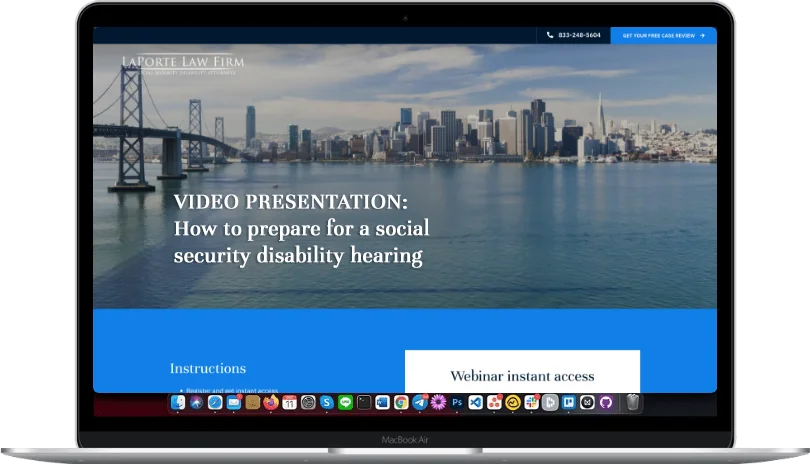
Caring for a premature baby comes with unique challenges, not least of which is navigating the financial support systems designed to assist families. Supplemental Security Income (SSI) offers crucial financial aid to families with premature babies, yet understanding and accessing these benefits can be daunting. Misconceptions about eligibility and the confusing application process often stand in the way of the support families need.
SSI provides income support for low-income families with children with disabilities. If your child is born prematurely, and your family meets the nondisability income requirements, your family may qualify for a monthly Social Security payment. Even if you are working, if you have a child under the age of 18 that is disabled, they may qualify for SSI, although your work income may be “deemed” as disqualifying resources to the disabled child.
Check out our blog post on SSA’s deeming rules for more information about family resource limits.
This article delves into navigating SSI for premature babies, simplifying the application process, eligibility criteria, and how benefits are determined.
Understanding SSI for Premature Babies
The average birth term is 40 weeks, and any children born prior to 37 weeks is considered premature. The earlier that a baby is born prior to the 40 week mark, the more likely the baby will experience physical or developmental delays.
For families with premature babies facing medical challenges,Social Security programs can provide much-needed support. Supplemental Security Income offers financial assistance to low-income families with children with disabilities, including premature infants who have severe medical conditions or low birth weights. These programs are overseen by the Social Security Administration (SSA) and are designed to alleviate the financial burdens associated with intensive care, ongoing medical treatments, and other essential services for children.
Definition of disability for premature babies
Supplemental Security Income is a federal program designed to help those with disabilities, including children, who come from low-income families. In order to be eligible for SSI disability, your child’s medical records must demonstrate that their condition meets or equals an SSA Listing. For a complete list of Social Security’s childhood listings, check out the SSA’s Blue Book.
Social Security does not have a specific listing for premature babies, but premature babies may qualify for SSI on the basis that their medical condition equals, or is roughly similar to, one of the SSA’s other listed impairments. A common listing that premature babies may equal is Listing 112.14, which applies to developmental disorders in infants and toddlers. In order to qualify for SSI disability under Listing 112.14, the medical records must satisfy the following requirements:
- Medical documentation of one or both of the following:
- A delay or deficit in the development of age-appropriate skills; or
- A loss of previously acquired skills
AND
- Extreme limitation of one, or marked limitation of two, of the following developmental abilities:
- Plan and control motor movement
- Learn and remember
- Interact with others
- Regulate physiological functions, attention, emotion, and behavior
Some premature babies also have vision issues, and may qualify for SSI under Listing 102.02 Loss of central visual acuity. Under this listing, SSA will evaluate the child’s medical records under the following criteria:
A. Remaining vision in the better eye after best correction is 20/200 or less.
OR
B. An inability to participate in visual acuity testing using Snellen methodology or other comparable testing, clinical findings that fixation and visual-following behavior are absent in the better eye, and one of the following:
- Abnormal anatomical findings indicating a visual acuity of 20/200 or less in the better eye (such as the presence of Stage III or worse retinopathy of prematurity despite surgery, hypoplasia of the optic nerve, albinism with macular aplasia, or bilateral optic atrophy); or
- Abnormal neuroimaging documenting damage to the cerebral cortex, which would be expected to prevent the development of a visual acuity better than 20/200 in the better eye (such as neuroimaging showing bilateral encephalomyelitis or bilateral encephalomalacia); or
- Abnormal electroretinogram documenting the presence of Leber’s congenital amaurosis or achromatopsia in the better eye; or
- An absent response to VER testing in the better eye.
Premature babies may also suffer from hearing loss. For premature babies under the age of 5 who have the following average air conduction hearing threshold, SSI will be approved:
102.10 Hearing loss not treated with cochlear implantation: For children from birth to the attainment of age 5, an average air conduction hearing threshold of 50 decibels or greater in the better ear (see 102.00B2)
Premature babies also have a significant risk for cerebral palsy. If a premature baby has cerebral palsy, their claim for SSI will be approved under Listing 111.07. Cerebral palsy is characterized by disorganization of motor function in two extremities (see 111.00D1), resulting in an extreme limitation in the ability to stand up from a seated position, balance while standing or walking, or use the upper extremities.
Key differences between SSI and SSDI
While they both provide disability benefits, SSI and SSDI differ in several key areas. SSI is needs-based and evaluates eligibility by considering family income and resources. This program primarily assists children in low-income families who have significant functional limitations due to their medical conditions. Conversely, SSDI requires a work history, so a premature baby would clearly be ineligible for SSDI since they have never worked or paid Social Security taxes. . This means eligibility is linked to Social Security tax contributions rather than income levels.
While SSI continues until the child reaches age 18, when adult criteria are reassessed, SSDI focuses more on lifetime credits accrued through work, and benefits may extend to adult children of disabled or retired parents under the Disabled Adult Child benefit, which requires a finding of disability under the adult rules for those ages 18+.
Both programs, though distinct, play crucial roles in providing financial relief to those in need, helping manage the costs stemming from severe disabilities and health issues.
Low birth weight requirements
For infants, low birth weight is a critical factor in determining SSI eligibility. Babies weighing less than 1,200 grams (around 2 pounds, 10 ounces) at birth qualify automatically for SSI benefits. This is based on the SSA’s criteria under listing 100.04A, which recognizes low birth weight as a disability due to likely health implications. Infants with a birth weight between 1,200 and 2,000 grams (approximately 4 pounds, 6 ounces) may still qualify if they are considered small for their gestational age.
The SSA assesses low birth weight using an infant’s initial weight recorded immediately after birth, verified via a birth certificate or physician-signed record. This weight acts as a benchmark to compare with other impairments listed by the SSA, ensuring consistent evaluation.
100.04 Low birth weight in infants from birth to attainment of age 1
A. Birth weight (see 100.00B) of less than 1,200 grams.
OR
B. The following gestational age and birth weight:
| Gestational Age (in weeks) | Birth Weight |
| 37–40 | 2,000 grams or less |
| 36 | 1,875 grams or less |
| 35 | 1,700 grams or less |
| 34 | 1,500 grams or less |
| 33 | 1,325 grams or less |
| 32 | 1,250 grams or less |
Application Process
Applying for SSI benefits on behalf of a premature baby involves submitting an application and providing medical records that diagnose the physical or developmental delays that the baby is experiencing as a result of the premature birth. A DDS (Disability Determination Services) adjudicator will review all the evidence and make a decision regarding whether the baby meets or equals one of the Listed impairments for childhood. If Social Security denies your application, you have a right to file an appeal (called a Request for Reconsideration) and a request for a hearing before an administrative law judge if necessary.
Timelines for processing applications
Processing times for SSI applications for premature babies by the Social Security Administration typically span from six to nine monthss. However, infants born with an extremely low birth weight can receive SSI benefits immediately based on documented birth weight. This swift approval is based on a “presumptive disability,” meaning the SSA assumes the baby is likely to qualify for benefits because of their serious condition. This means the family can start getting SSI payments, as well as Medicaid benefits, right away, usually within a few weeks, even before the full application is finished. The SSA will still review the case later to make a final decision, but the early support helps families meet urgent needs.
Factors affecting benefit calculations
The amount of SSI benefits for a premature baby is influenced by various factors, the most important of which is the federal benefit rate for the year. In addition, state-specific supplements to the federal payment can alter the monthly benefit amount. Each state has the option to increase this amount, which affects calculations. Family income also plays a significant role since SSI is a needs-based program. The income and assets of the child’s parents are considered when determining benefits. Additionally, the number of other dependent children in the family can impact the calculations.
Expiry and Re-Evaluation of Benefits
When a baby is born premature and receives Supplemental Security Income due to low birth weight, it is crucial to understand the process of disability re-evaluation.. Social Security conducts periodic Continuing Disability Reviews (CDRs) to determine if the SSI benefits should continue or cease. If a premature baby is approved on the basis of low birth weight, but they achieve normal weight by age 2 and are not experiencing any other developmental delays, the SSA will send a notice of SSI cessation on the basis of medical improvement.
As with an initial application denial, you have the right to appeal a cessation notice.
Criteria for benefit expiration
SSI benefits given to premature babies usually expire after the first year if the child shows normal development. If a child gains age-appropriate weight and meets developmental milestones, the benefits are likely to stop. This outcome is determined after a CDR, which evaluates the child’s progress. The Social Security Administration checks if the medical conditions initially qualifying the child still meet or equal a Social Security Childhood Listing. If the child no longer meets these criteria, benefits will cease to ensure that resources are allocated to those still in need.
Medicaid Access and Provisions
Caring for a premature baby can be challenging, both emotionally and financially. Medicaid is a vital resource for families with premature infants, helping them manage medical bills and care. Premature babies may spend significant time in intensive care units due to their fragile health status and low birth weight. Medicaid can cover hospital expenses and continues to be crucial for ongoing medical needs at home.
In many cases, Medicaid eligibility aligns with receiving SSI benefits. This integration ensures families have access to necessary medical services at a reduced cost.
If you’re unsure about how to apply for SSI benefits or whether your child qualifies, the experienced team at LaPorte Law Firm is here to help. We’ll guide you through every step of the process and work to get you the support your family needs. Contact us today for a free consultation.
FAQS
SSI is a needs-based program for low-income families, often used for premature babies. SSDI is based on work history, which babies don’t have, so SSDI generally doesn’t apply unless through a parent’s work record after the child reaches age 18 (e.g. Disabled Adult Child, or DAC benefits).
A baby may qualify if they are born with a very low birth weight (e.g., under 1,200 grams).
It can take six tto nine months, though cases involving severe conditions like extremely low birth weights may be fast-tracked through the presumptive disability program.
For SSI, benefits start from the first full month after the application.















